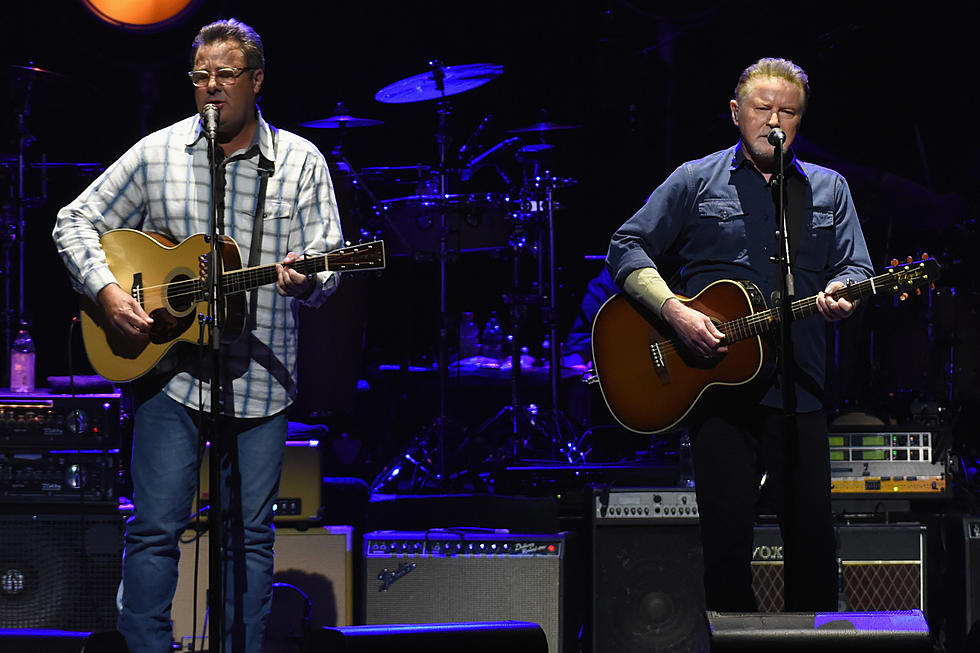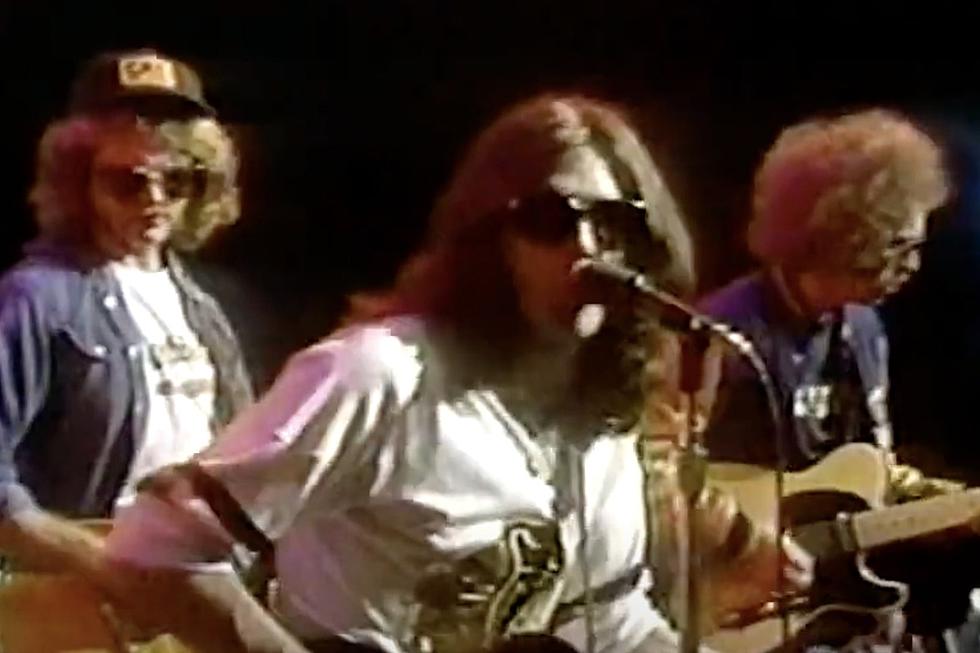
The Day the Eagles Fired Don Felder
Only two members of the Eagles had enjoyed longer tenures in the band when Don Felder was fired on Feb. 6, 2001. They were the only two who mattered.
In fact, a flurry of subsequent lawsuits laid bare the hard-eyed power structure of a group that rose to fame espousing the virtue of peaceful, easy feelings. Felder departed, like Bernie Leadon and Randy Meisner before him, and co-founders Glenn Frey and Don Henley simply continued on as the Eagles. Even when they began inviting former members back for the History of the Eagles tour in 2013-15, Felder was pointedly left out.
His presence in that history, between 1974-80 and again from 1994-2001, proved to be a fulcrum for their superstardom. Despite the ugly end, Felder played an important role in helping the Eagles transition from the countrified sounds of the Leadon-Meisner years toward the more rock-oriented era with Joe Walsh.
Along the way, Felder survived a messy breakup and a lengthy layoff, and then participated in a surprising reunion and the Eagles' Rock & Roll Hall of Fame induction. The trouble started when Felder began to question Frey's and Henley's role as band leaders – specifically how they split the Eagles' financial pie.
He complained, for instance, that they'd founded a separate company to handle a career-retrospective box set without involvement from Felder, Walsh or Timothy B. Schmit. "The greed of Henley and Frey," Felder said in a subsequent lawsuit, "became more insatiable with each new project." A letter from Eagles manager Irving Azoff firing Felder set off a torrent of court actions.
Felder's suit claimed wrongful termination, and breach of contract and fiduciary duty. The filing outlined a work atmosphere dominated by "constant threats that if Felder did not agree with Henley and Frey, Felder would be 'thrown out' of the band." Felder said that since he was originally brought in as a full partner, he could not be fired or voted out. Henley, Frey and Azoff responded, pointing to a clause in the agreement that stipulated circumstances in which partners could, in fact, be terminated.
Plans for a tell-all Felder autobiography led to yet another suit, as Frey and Henley attempted to stop its publication. The memoir was ultimately delayed for a couple of years, arriving in 2009 as Heaven and Hell: My Life in the Eagles. In it, he derisively refers to Frey and Henley as "the Gods."
By then, the legal actions had been settled out of court, six years after Felder was let go. Neither side disclosed the terms; they simply moved on. For the remaining Eagles, that meant issuing 2007's Long Road Out of Eden, their first LP of all-new material since The Long Run in 1979. Frey and Henley wrote or co-wrote 14 of the album's 19 tracks, and the Eagles remained a top live draw. "We felt like, and we still feel like, we are the leaders of this band, although we certainly do listen to the opinions of the other guys," Henley told news.com.au in 2014. "We all seem to be able to reach consensus these days and go forward."
After a lengthy period of reflection, Felder finally emerged with 2012's Road to Forever, his first solo project since 1983's Airborne -- a long-ago period when there still seemed to be some hope for reconciliation among the battling bandmates. Back then, the just-released Eagles Greatest Hits, Vol. 2, featuring a pair of Felder cowrites, was on its way to selling a whopping 11 million copies in the U.S. alone. Highlights included "Hotel California" and "Victim of Love," perhaps the best of six tunes on which Felder shared songwriting credit with the Eagles.
Still, the bulk of the Eagles' songs were written and sung by Frey and Henley. Felder's principal contributions could typically be found – as with his Eagles debut, playing slide on "Good Day in Hell" from 1974's On the Border – behind the scenes, in arranging and on solo projects.
Listen to the Eagles Perform 'One of the These Nights'
Introduced as a full-fledged member on 1975's One of These Nights, Felder's distinctive guitar on the hit Frey-Henley title track will always be better known than "Too Many Hands," his songwriting collaboration with Meisner from the same album. "Those Shoes," a 1979 talk-box favorite that had Felder's fingerprints all over it, was sung by Henley. In fact, 1974's "Visions" is the only Eagles tune with Felder at the mic.
Perhaps inevitably, the Eagles were riven for a time by largely ego-driven internal strife, even as they sold more than 80 million albums. Felder represents the group's most prominent departure, but he was by no means the only one. "When I first walked in, everything seemed crazy," Felder told the Los Angeles Times in 1994. "Bernie was quitting and Randy was talking about quitting. Everyone was yelling at each other and fighting. They had just fired their manager and their producer. I thought I had joined a band that had just broken up. 'Oh,' I said to myself, 'smart move.'"
Leadon would leave in 1975; Meisner followed two years later. By 1980, inner-band tension had torn apart the entire enterprise, but not before one last onstage tiff between Frey and Felder. After almost 15 years apart, the Eagles reunited for the appropriately titled Hell Freezes Over. But even then, Felder's lawsuit argued, the seeds of another split were being sewn.
He says they'd previously divided all band revenue equally, but that Frey and Henley demanded a new '90s-era structure favoring their chart-proven partnership -- and threatened to fire Felder before the reunion ever got underway unless he agreed. He initially signed off, but in the ensuing years, arguments over money only worsened. In a collaboration of equals, some Eagles were simply more equal than others.
By the time it was over, Felder had lost more than just the Eagles. He also endured a separation from his spouse of nearly three decades.
"When I left the band, in that same 12-month period, I went through a separation and divorce with my wife," he said in a 2012 interview. "So, all of the images that I had adopted and had been wearing for almost 30 years — in a rock band, with a group of people that I considered my friends in the Eagles, being married, a father, family man — all of that was stripped away. So, I really wanted to figure out how I got from this little dirt road in Gainesville, Fla., where I was born and raised, through this whole process to where I joined the Eagles, what happened to me while I was in the Eagles and, now that I was no longer a part of that machine, who I was. What were the lessons I had learned from that experience, so I could go forward the rest of my life without carrying that unresolved baggage?"
More than a decade after his firing would pass before Felder completed a long-awaited solo album. Anyone who saw the History of the Eagles documentary could sense how deeply wounded Felder remained about the whole incident -- to say nothing of how much resentment remained on the other side, too.
Felder admitted, in a 2013 talk with Billboard, that he was surprised by "the anger that was displayed, and the bitterness, especially from Glenn. It really left me taken aback that he was still so angry about all of that, and I couldn't understand why, to tell the truth. I've been way past it for about 10 years now." In time, he reached the kind of friendly detente with his ex that has remained elusive with his ex-buddies in the Eagles.
"My wife of 29 years and I now are still really close friends," Felder said in the 2012 interview. "We talk on the phone, she comes to my house for Thanksgiving. We have hundreds of friends together, children and grandchildren. There’s no reason to sever that relationship, or just slam the door on it. I’m the type of person who wants to maintain those friendships for a lifetime — especially someone who I have loved so dearly and cared so much about. You don’t just wad them up like a Dixie cup and throw them away. ... Unfortunately, that’s not the same attitude that I get from the Eagles, when I try to communicate with them. The only time that I hear back from them is through their attorneys. That’s just the way it is."
Top 10 Reunion Tours
See the Eagles in Rock’s Craziest Conspiracy Theories
More From US 103.1 FM










